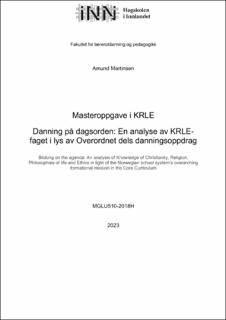Danning på dagsorden: En analyse av KRLE-faget i lys av Overordnet dels danningsoppdrag
Abstract
I læreplanverket ved Overordnet del spesifiseres det eksplisitt at skolen både har et dannings- og et utdanningsoppdrag. Allikevel defineres hverken danningsbegrepet eller hvordan løse danningsoppdraget. Et naturlig spørsmål som reiser seg, som Odin Fauskevåg (2022) også stiller, og som fungerer som denne oppgavens døråpner er: hvordan skal man løse et slikt uklart oppdrag?Danning er en vesentlig del av våre liv og handler om hvordan vi møter verden, filtrerer dens inntrykk og lar oss forme av og til den. Formålet med denne oppgaven har vært å undersøke hvordan danningsoppdraget kan forstås og hvilken rolle etikken særlig gjennom holdninger kan være med på å løse det. Dette er blitt gjort ved en kvalitativ dokumentanalytisk og hermeneutisk tilnærming, og har innebåret to analyser. En for å skape en forståelse av danningsoppdraget i lys av forskningslitteratur, og en for å belyse etikkens rolle i danningsoppdraget gjennom læreplanen i KRLE.Analysene viser at danningsoppdraget inneholder to viktige dimensjoner: (elev)aktivitet og innholdstilrettelegging. Fokuset helner mot det prosessuelle aspektet ved danning, og ikke det resultatmessige. Skolens verdigrunnlag fremstår som essensielt i løsningen av danningsoppdraget, og ved hjelp av Asheims (1997) rammeverk for modernisering av dydsetikk til holdningsetikk finner vi at verdiene selv kan forstås som holdninger og slik fungere som en form for holdningsdanning.Utblikket tilsier at en forhøyet bevissthet rundt verdier og holdninger samt nøye planlagt undervisningsinnhold med en baktanke om hva som er relevant for elevens livsførsel kan gjennom verdiformidling og undervisning være del av danningsoppdragsløsningen. Ved at de eksponeres for skolens ytre verdier, samhandler med andre og opplever utfordringer som krever etisk refleksjon rundt verdier og holdninger kan dette hjelpe oppdragsløsningen.
Nøkkelord: Danning, danningsoppdrag, LK20, etikk, holdninger, holdningsetikk, dydsetikk English title: Bildung on the agenda: An analysis of Knowledge of Christianity, Religion, Philosophies of life and Ethics in light of the Norwegian school system’s overarching formational mission in the Core CurriculumIn the Norwegian school system’s curricular framework, it is explicitly stated that there are both an educational and a formational mission in the Core Curriculum. Although this is the case, neither the term Bildung (formation) or how to solve the formational mission is defined. The issue of how to resolve this ambiguous mission is a key question raised by Odin Fauskevåg (2022) and serves as the foundation for this study.Bildung is an essential part of our lives and concerns how we encounter the world, filter its impressions and allow ourselves to be shaped by and into it. The purpose of this study has been to examine how this formational mission can be understood and what role ethics, particularly through attitudes, can have in solving it. This has been done through a qualitative document analysis with a hermeneutic approach, involving two analyses. One to create an understanding of the formational mission in light of research literature, and another to highlight the role of especially ethics in the formational mission through the curriculum in Christianity, Religion, Philosophies of life and Ethics (CRPE).The analyses show that the formational mission contains two important dimensions: (student) activity and facilitation. The focus leans towards the procedural aspect of Bildung, rather than the outcome-oriented aspect. The school’s values appear to be essential in solving this mission, and by using Asheim’s (1997) framework for modernizing virtue ethics into ethics of attitudes, we find that values themselves can be understood as attitudes and thus function as a form of formation by attitudes.This study’s outlook suggests that an increased awareness of values and attitudes, as well as carefully planned teaching content with a consideration of what is relevant to the student’s way of life, can be part of the solution of the formational mission through value transmission and teaching. By exposing students to the school’s external values, interacting with others, and experiencing challenges that require ethical reflection on values and attitudes, this can in turn help with the mission’s solution.
Key words: Bildung, the Norwegian school system’s formational mission, ethics, view ethics
